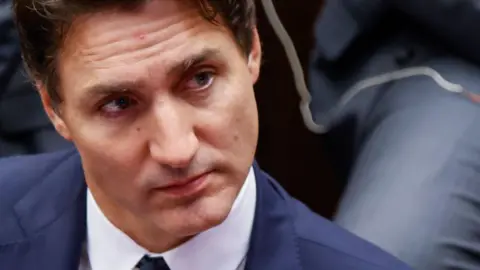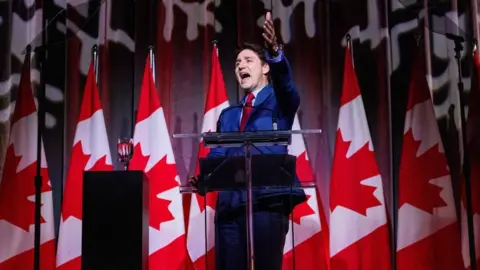 Getty Images
Getty ImagesIt was one of the worst weeks of his political career, and Canadian Prime Minister Justin Trudeau was ringing in the season.
At the Liberal Party's annual gathering, Trudeau put his party face on display, even though he had been blindsided the day before by the sudden resignation of one of his most trusted allies, Finance Minister Chrystia Freeland, just hours before. before she presents an economic statement to Parliament.
But even as some in his own party called for him to leave, the prime minister struck a resolute and defiant tone as he addressed the party faithful in his dark blue suit and tie.
He referred to his “difficult” week, comparing it to a family argument.
He spoke of being “bold” and “ambitious” in the face of adversity, and made pointed criticisms of his political rival, Pierre Poilievre, the leader of the Conservative Party of Canada.
Pundits later remarked that it sounded a lot like a campaign speech and that, despite the latest political turmoil, Trudeau appears to be getting into it.
That position did not change Friday, even after the leader of the country's progressive New Democratic Party (NDP), Jagmeet Singh, said he would introduce a motion to oust the Trudeau government in the new year. It was the support of the NDP that allowed the Liberals to remain in power. Elections now appear imminent.
Yet Trudeau has so far given no indication that he will resign soon, although he has reportedly told fellow party members that he will take time over the winter break to think about what he should do.
Political observers say Trudeau has often demonstrated a certain defiant attitude when under pressure, which has helped him weather a number of controversies during his nine years in office.
And he has often been underestimated, as when he won a majority government in 2015 at the age of 44, despite being described by his political opponents as a dilettante.
But as pressure mounts for him to resign, some of those same experts say he may need a new strategy.
 Reuters
ReutersProve your doubters wrong
When Trudeau first ran for prime minister, three words followed him: “I’m just not ready.”
The phrase was the slogan of an attack ad aired repeatedly across the country as he attempted to unseat incumbent Prime Minister Stephen Harper, a Conservative who has been in power since 2004.
It conveyed the common criticisms he faced at the time regarding his young age, relative lack of experience, and winding path to politics.
Trudeau “kind of wandered” in his early life before becoming a drama teacher in Vancouver, said Canadian historian Raymond Blake, apparently isolated as the well-known and wealthy son of former Prime Minister Pierre Elliott Trudeau.
But soon after entering politics, Trudeau took a combative stance.
It's a trait some say he learned from his father, who was known for his charismatic but combative leadership style, and who is famous for his “look at me” catchphrase, which he said casually to a journalist at the height of a political crisis. crisis.
“His father had the image of a really resilient, very tough politician,” said Lawrence Martin, a longtime Canadian political columnist based in Washington, DC.
The young Trudeau himself defied the odds by winning a historic victory for his Liberal party, taking it from third place in Parliament to a majority mandate in its first federal election.
“It gives him the feeling that he can overcome big obstacles,” Mr. Martin said, adding that, politically, Trudeau acts with “hyper confidence in himself.”
Trudeau's path to power became rocky once he took office, having been embroiled in a number of political scandals.
During her first term, Justice Minister Jody Wilson-Raybould – the first Indigenous woman to hold the position – resigned following what she described as attempted interference and “veiled threats” from the from top government officials seeking legal favor for a company facing a corruption trial. .
While seeking a second term in 2019, Trudeau's re-election campaign was rocked by published images showing him as a younger man sporting brownface on at least three occasions.
And a year later, in 2020, Trudeau faced another ethics scandal involving a potentially large government contract for a youth charity that had worked with members of the Trudeau family.
But despite each setback, Trudeau retained power. He was re-elected twice, making him the longest-serving leader among his G7 peers.
“Trudeau has survived so much,” Professor Blake said, noting that his political successes and leadership won the loyalty of many in his party despite the scandals.
Is Freeland’s departure a turning point?
Although Trudeau has weathered many storms, there are signs that his time may be up.
On the one hand, history is not on his side. Only one Canadian prime minister, Sir John A. MacDonald – the country's first – has served four consecutive terms.
Trudeau is also battling declining popularity. A September Ipsos poll suggested that about two-thirds of Canadians disapprove of him. Only 26% of those surveyed said Trudeau was their first choice for prime minister, putting him 19 points behind Conservative Leader Poilievre.
And then there's the slowly dwindling support within Trudeau's own party. So far, at least 18 Liberal MPs have called for the departure of their leader.
“He's deluding himself if he thinks we can continue like this,” New Brunswick MP Wayne Long said this week.
“It's unfair to us MPs, it's unfair to ministers and, above all, it's unfair to the country. We need to move in a new direction and we need to start again.”
According to Long, who led the campaign to impeach Trudeau, as many as 50 of 153 Liberal MPs want him to resign immediately. About the same number are Trudeau loyalists, he said, and the rest are on the fence.
“There are still party faithful who love him and, you know, still want to support him,” Mr. Martin said. the DC-based columnist. “But if the Liberal caucus held a secret vote on whether he should stay or not, he would be easily defeated.”
The prime minister also appears to be driven to stay by his contempt for his political opponent Poilievre, Mr. Martin observed.
“He doesn’t want to back down and he wants to face Pierre Poilievre, who he hates,” he said.
Trudeau's stubborn persistence in the face of bleak political forecasts has led to comparisons with outgoing US President Joe Biden, who abandoned his candidacy months before the November election only after growing internal pressure.
Professor Blake said Trudeau's legacy, like Biden's, will depend on how he leaves the country. Fighting a losing battle, he said, could leave Trudeau with “a lasting scar.” But the Prime Minister has a remarkable capacity to survive, he stressed.
“He's a survivor, and he didn't do what's normal. Will normalcy – whatever it is – happen this time? Maybe, but I'm not convinced.”
Trudeau's dilemma is also similar to that faced by his father, who won three consecutive elections and then a fourth after leaving power for less than a year.
But in 1984, more than 15 years after becoming prime minister, the elder Trudeau – like his son today – faced a disastrous election. It seemed clear that he would not win the next election if he remained in power. He decided to withdraw, telling the public that he made this decision after walking in a snowstorm in Ottawa.
Since then, the term “walking in the snow” has become synonymous with political resignation in Canada. This Christmas, it remains to be seen whether Trudeau will take his own walk.
#Faced #turmoil #defiant #Trudeau #hangs
